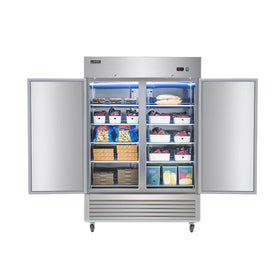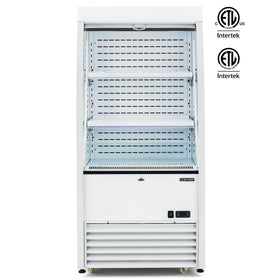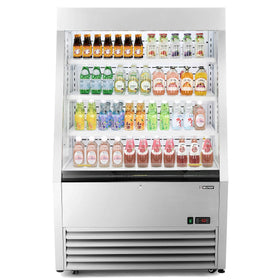UL certification isn’t just a label—it’s proof that a refrigerator has passed rigorous safety, sanitation, and performance tests. The main advantage of UL certification is that it signifies credibility-both to authorities and customers in the marketplace.
However, UL certification is not mandatory (at least not in the U.S), so the question for many rational restaurant owners would be: why should I get it? What am I missing out on if I choose not to have my commercial refrigerators certified?
Without UL certification, you might be exposing your business to risks that could compromise everything from food quality to your bottom line.
Let’s explore the key areas where non-UL-certified refrigerators can cause problems.
1. You are More Vulnerable to Food Safety Risks
It is not uncommon for commercial refrigerators to sometimes fail to maintain consistent, safe temperatures. This tends to happen especially during high-usage hours or defrost cycles.
An ineffective commercial refrigerator can be a prominent cause of food safety risks in a commercial kitchen, and cost the business in several ways:
- Food gets completely spoiled or partially frozen
- Bacterial growth intensifies due to temperatures rising above 41°F (5°C)
- Increased risk of foodborne illnesses like Salmonella or Listeria, which can hurt customers
Any of these factors can be a huge liability, especially in commercial kitchens where cross-contamination can happen quickly.
With a UL-certified refrigerator, you guard against these risks. UL carries out a performance test on all commercial refrigerators under UL 471 and NSF/ANSI 7 standards prior to granting the UL-certified mark.
These tests, and the mark, give you the assurance that the commercial refrigerator is capable of maintaining stable internal temperatures even in harsh kitchen environments
Take note that UL continues to conduct periodic inspections to ensure those standards are maintained, and you never fall prey to the consequences of food safety risks.
2. You are More Likely to Fail Health Inspections
The UL certification mark is recognized by authorities and organizations like the FDA. Health inspectors in certain states often require refrigeration units to meet NSF/ANSI sanitation standards (verified by UL EPH Certification).
With a non-UL-certified commercial refrigerator, there are many ways you could fail a health inspection test:
- Surfaces may not be cleanable
- Drainage or defrost systems may cause water accumulation
- Seals or gaskets may harbor bacteria
UL ensures that your commercial refrigerator is apt to pass inspections with features like smooth, sealed surfaces, proper drainage, and food-safe materials. The UL EPH Mark is recognized and accepted as a trusted source for assessing the sanitary design, construction, and performance of commercial food equipment.
UL sanitation certification indicates that your commercial refrigerator has been tested and was found to meet applicable environmental and public health standards.
3. Increased Fire & Electrical Hazards
Non-certified refrigerators may use non-compliant wiring, flammable insulation, or lack proper circuit protection. There is no way to be certain except through rigorous testing and inspection, which UL does. With a refrigerator that is not UL certified, there is no way of telling to what extent you might be vulnerable to fire and safety risk factors like:
- Electrical fires
- Overheating of motors or compressors
- Short circuits
Electrical controls intended for residential and commercial refrigeration applications are usually certified according to the IEC/UL/EN 60730 Standard series. UL Services evaluates electrical and mechanical safety under real-world use. Certified units undergo stress testing to ensure protection against hazards.
4. Higher Operating Costs
Non-certified refrigerators are often inefficient or untested for energy performance. As a result, they might end up consuming much more energy than they ordinarily would, and ramping up business costs.
- Poor insulation means higher energy use
- Inconsistent compressor cycles mean unnecessary spikes in energy usage
All these can result in a lack of ENERGY STAR or DOE compliance, which does not bode well for your restaurant. You could end up spending hundreds or thousands more per year on energy bills, especially with multiple units running 24/7.
There are many ways a UL-certified commercial refrigerator reduces energy costs in a restaurant or food business.
UL Services is very adept at testing for energy efficiency. The UL Verified Mark can help showcase that your commercial cooking appliances limit the emission of grease-laden air to the room to under 5 mg/m3 avg. using the EPA-202 test method based on your specifications and food types used.
5. Poor Reliability & More Breakdowns
Without UL certification, there is hardly any equally reliable way of identifying whether your commercial refrigerator is made with cheaper parts, lacking durability in commercial environments. Every time your fridge fails, you risk losing inventory, interrupting service, or delaying operations.
You might be vulnerable to any of the following commercial refrigerator issues:
- Thermostat failure
- Compressor burnout
- Gasket and door seal wear
- Inconsistent temperature control
UL-certified units are tested to withstand commercial-level wear and tear. Moreover, during the UL certification process, UL technicians test if they are built using UL-recognized components (like motors, controls, and fans).
The peace of mind knowing that your commercial refrigerator, which is arguably the heartbeat of your commercial kitchen, is capable of offering a stable and reliable performance makes UL certification worth having.
6. Your Customers Might Lose Trust
Customer trust is like oxygen to every restaurant or food business; the moment customer trust is broken, there is almost no way of rescuing the business. Customers expect clean, safe, professional food service environments
If something goes wrong:
- A foodborne illness outbreak can tank your reputation
- Visible equipment failures reflect poorly on your operation
- Word of mouth and reviews may suffer
UL certification signals professionalism and a commitment to quality, not just to inspectors, but to customers and staff alike.
The UL-certified mark is commonly and easily recognized by people all over the country. Customers see that mark as an indicator that you care about their safety, which translates into more and better customer trust. It may even contribute to better reviews, which leads to more customers and better business.
7. Insurance & Regulatory Trouble
Many insurance companies and local building codes require UL or equivalent certification for commercial appliances. Without a UL-certified mark, you might run into one or more of the following unpleasant insurance hurdles.
- Insurance claims may be denied (especially fire-related)
- Permits may be delayed or revoked
- You might face additional scrutiny during a routine inspection.
UL certification gives legal assurance that a product meets safety standards. Without it, liability increases, and your risk profile goes up.
UL-Certified vs. Non-UL-Certified Refrigerators
| Category | UL-Certified Refrigerator | Non-UL-Certified Refrigerator |
| Food Safety | Holds steady temps; food-safe interiors | Temperature swings, bacteria-prone materials |
| Health Inspections | Meets NSF/ANSI sanitation standards | Risk of violations; non-compliant materials |
| Electrical Safety | Tested for fire, shock, and overheating | Higher fire risk; untested wiring or insulation |
| Energy Efficiency | Meets ENERGY STAR and DOE standards | Likely higher operating costs |
| Reliability | Commercial-grade components, long lifespan | Frequent repairs; breakdown-prone |
| Insurance Compliance | Accepted by most insurers | May void coverage |
| Customer Trust | Reinforces professionalism and safety commitment | Perceived as cheap or risky |
Final Thoughts: Why You Should Stick to UL-Certified Equipment
In a commercial kitchen, the smallest equipment failure can have big consequences. UL-certified refrigerators reduce that risk by giving you tested, dependable, regulation-ready performance.
If you’re shopping for a commercial refrigerator, make UL certification a non-negotiable requirement. It might cost a bit more upfront, but the long-term protection, reliability, and peace of mind are worth every penny.










